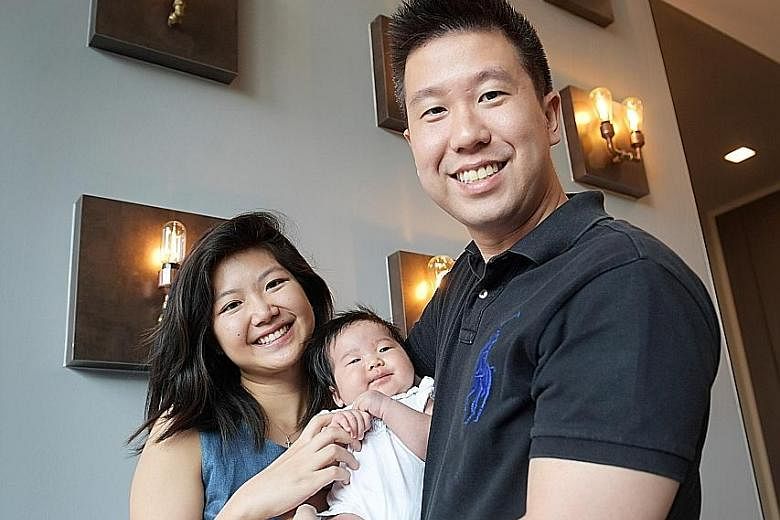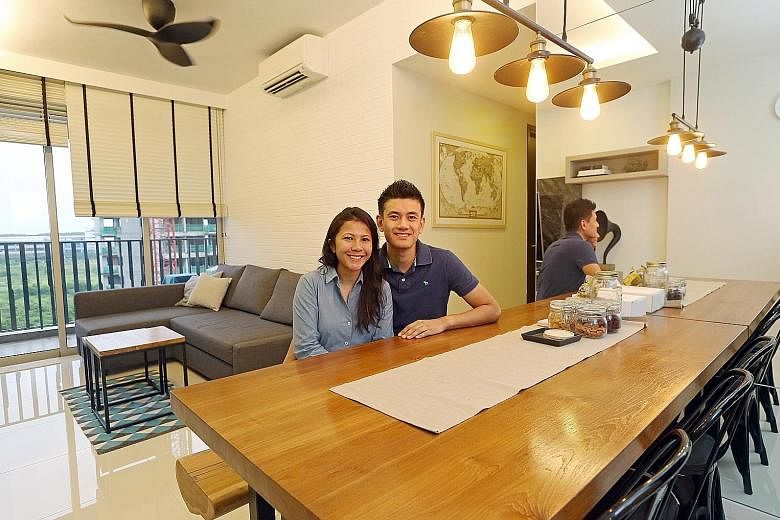Just a month into his new job in October, technology manager Aloysius Chong took two weeks off to be a dad.
His wife Nina, 28, had given birth to their first child Hailey, and he wanted to be there for his family. A fortnight was long enough for him to learn to care for his daughter and adjust to the new routine, he said.
Mr Chong, 32, who works in a five-man technology start-up, was lucky to have a supportive boss and colleagues, who he described as being "family men".
But for other soon-to-be dads with bosses less than keen to grant them time off, a new measure that kicks in today will help: Men whose children are born from today will get two weeks of mandatory paid paternity leave, instead of one week.
The extra week of paternity leave was announced during last year's Budget as one of several ways the Government is supporting young families and encouraging more married couples to have children.
TIME TO ADJUST
Paternity leave, first made compulsory in 2013, has taken time to catch on.
One week of paternity leave was introduced then, but only 38 per cent of eligible fathers made use of this in 2014, and just 42 per cent did so in 2016.
Companies were given the leeway to decide whether or not to give their employees a second week off.
Mr Chong said that most of his friends working in the private sector took about half a week of paternity leave when their child was born, and returned to work when their wife checked out of the hospital.
They then spread the remaining days over the rest of the year.
He said: "The bankers can't leave their jobs for too long because of the fast pace of their work. They don't really have people to cover them, and their superiors chase them for numbers. And some of my friends who work in small family businesses say there just aren't enough people to take over."
His public-servant friends, though, seemed to have it better, he said, adding that he was told their bosses tend to plan far in advance for officers to cover them in their absence.
The civil service is also piloting a scheme to let mothers take no-pay leave in their child's first year.
Now, with two weeks of mandatory paternity leave, Mr Chong hopes more people will make use of the entitlement.
"I'd tell new dads, always put family before your work because if everything at home is settled, you will be even more productive at work," he said.
NTUC FairPrice chief executive and Marine Parade GRC MP Seah Kian Peng believes that companies would find a solution to juggling operational constraints and letting employees go on parental leave.
Mr Seah, who is a board member of the Centre for Fathering, said: "Allowing parents to spend time with their newborn and with their wives will lead to a happier, less stressed father."
He added that this would make the fathers better workers.
Companies have said they needed time to adjust to the new policies, especially as they also face the challenge of staying competitive in the slowing economy.
Given this, said Mr Seah, "all the more, we need all our staff to be fully motivated, focused and productive both at home and at the workplace".
Therefore, it is in companies' interest to encourage their employees to fully take up their paternity leave where eligible, argued Mr Seah, who oversees 10,000 employees.
In an October interview, Mrs Josephine Teo, who is in charge of population matters, said that quite a lot had been done recently to increase leave entitlements.
In another measure, from July 1, working mothers can share up to four weeks of their paid maternity leave with their husbands. Now, they can share only one out of the 16 weeks they get.
Couples also get housing grants, and parents can get subsidised infantcare and childcare, and pay less out of pocket for hospital deliveries.
As more young families often have both parents working, the Government is also exploring ways to expand the number of childcare and infantcare places.
Mrs Teo added that the Government was likely going to take a pause for now, and further family-friendly leave entitlements are unlikely to be unveiled this year.
Instead, the focus would be on encouraging more companies to offer flexible work arrangements, for instance, so that they become a more widely-accepted norm.
ENCOURAGING SIGNS
Debate has always been rife about whether such measures would spur Singaporeans to have children.
The total fertility rate, or average number of children a woman will have, has hovered around 1.2 in the past 10 years, and was at 1.24 last year - well below the 2.1 needed for the population to replace itself.
But the signs in recent years have been encouraging. There were 33,725 citizen births in 2015, the highest number in the last 13 years.
Couples interviewed said that one key factor affecting their decision to have children was the availability of housing.
Writer Stacey Leong, 28, and engineer Justin Cai, 33, who got married in 2015, plan to start a family after moving into their own home.
They have been allocated a subsidised rental flat in Commonwealth under the Parenthood Provisional Housing Scheme while waiting for their Build-to-Order flat, which will be ready by the middle of the year.
"We wanted our privacy," said Ms Leong, adding that it would be stressful and inconvenient to be pregnant and have to move into their new place at the same time.
Account manager Farah Sidek, 30, also had the same considerations when deciding on parenthood with her husband, project manager Farhan Yusoff, 34. "I think it's much easier to settle down in your own place and then have a kid," she said.
But she added: "I know of Singaporeans who have large families even if they're living in three-room flats, and I've seen Singaporeans like myself who wait until they have a place to start having a family."
She counted herself lucky to have got a flat on the first try. She and her husband collected the keys to their executive condominium in Punggol in November 2015.
Although they have no kids yet, Ms Farah has plans for a big family. "The ideal for me is four. But if we have a larger family we'll have to think about affordability and space constraints, and make some changes to our lifestyles. The next step would be upsizing to a larger flat," she said.




